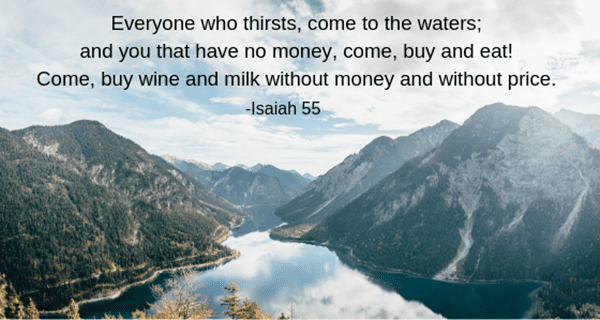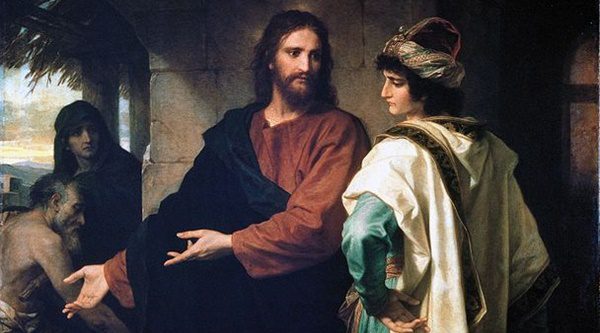Welcome to Jesus Unmasked, a weekly exploration of scripture that delves into Jesus’s life and teachings. Over the centuries, Jesus has been obscured by prejudice and bigotry. God in flesh, crucified by human violence, has been invoked to inflict ever more violence on others. Racism, homophobia, transphobia, xenophobia and prejudice against people of other faiths have all been waged in the name of Jesus. These forms of fear and hatred are masks that obscure the truth: that Jesus is Love Embodied. We seek to pull back the masks that hide and distort Jesus so that his love can be revealed and we can follow in his way. We unmask Jesus even as Jesus unmasks us, lifting the blinders of prejudice from our own eyes. We welcome you to join us live, Wednesdays at 10:30 AM CT, on the Raven Foundation Facebook page. This episode explores Luke 12:13-21.
The Set-Up
Jesus was speaking to a crowd of thousands. In fact, there were so many people “that they trampled on one another.” Ha! I mean, Ouch!
Thousands came to hear Jesus, but Luke tells us that he spoke to his disciples first. He warned his disciples to “beware of the yeast of the Pharisees, that is, their hypocrisy.” In other words, “Don’t take these Pharisees on as a model.” Jesus teaches the disciples and then he is interrupted…
The Passage
… by some guy in the crowd. He interrupts Jesus, seemingly mid-sentence, and says, “Teacher, tell my brother to divide the family inheritance with me.”
This brings up all kinds of questions about social justice and sibling rivalry. We don’t know anything about this man’s backstory. Is he left destitute because his brother will selfishly hoard his family’s wealth? Or is he pretty well off and he’s demanding Jesus settle a sibling rivalry?
We don’t know for sure, but Jesus said to him, “Friend, who set me to be judge or arbitrator over you?”
Isn’t Jesus the judge? Like, didn’t God set Jesus in that role?
Or is something else going on here? It seems that maybe this man is trying to get Jesus to join his side against his brother. A little triangulation. Jesus wisely refuses to take the bait. Instead, he steps back and tells a parable.
A man’s field produced an abundance of grain. He had so much that he destroyed his old barns and built newer and bigger barns to store all his grain! Then he will say to his soul, “Soul, you have ample goods laid up for many years: relax, eat, drink, be merry.” Life is good because I have saved up for myself!
Then God says to the man, “You fool! This very night your life is being demanded of you. And the things you have prepared, whose will they be?”
Jesus explains that the man stored up treasures for himself and so he “was not rich toward God.”
But wait – is planning ahead always evil and selfish?
Let’s contrast Jesus’ parable with the story of Joseph in Genesis. Joseph had a dream about pleasantly plump cows and fat cows who died. The point of the dream was that Egypt would have seven years of plenty and then seven years of famine. So Joseph stored seven years of grain in the granaries. In fact, he stored so much grain that he had enough for Egypt and the whole middle east. This was a great thing!
So the problem with the man in Jesus’ parable was not that he stored up grain, but that he was greedy. He only thought about himself. Joseph was rich toward God because he planned ahead to love his neighbors, even his neighbors beyond Egypt. But the man in Jesus’ parable hoarded things for himself.
Current Events
Check out this video of Cornell West on the Joe Rogan Podcast. West claims that the American dream has failed us because it was always about the individual. Me. Myself. And I.
But for the American dream to become a reality, it needs to have another component – you. The American dream can lead us to be like the man in Jesus’ parable who just looks out for himself. When we live our lives this way, we are neither rich toward God nor rich toward our neighbors. We may have a lot of grain in our buildings, but our relationships become empty.
Conclusion
What really matters is the kind of God we believe in. Is God stingy? Or does God want to give to us? Can we trust that God will give us enough for everyone?
That’s where this parable is leading us. Planning ahead is good, but relax because God is on your side. Trust that even though we might go through periods of famine, we can continue to share because God is with us and will continue to provide.
We hope that the man’s brother was with him. If they both heard the story, there is hope that both of their hearts would be moved away from a pattern of selfishness and towards a new pattern of generosity toward each other.
Photo by Sharon McCutcheon on Unsplash












